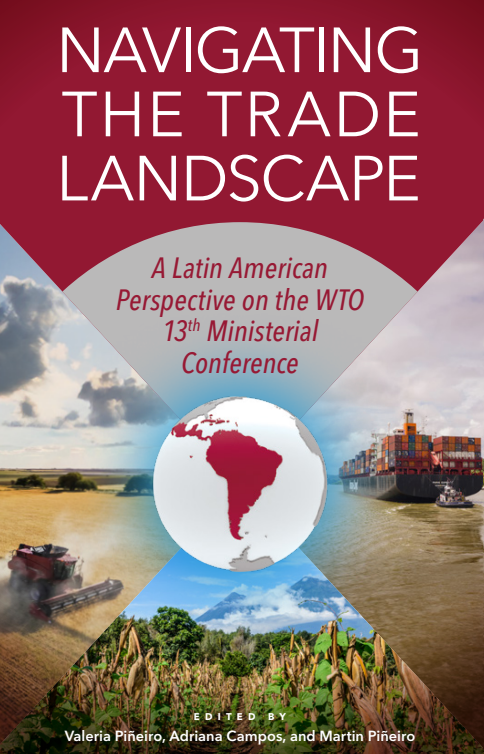The publication, entitled “Navigating the Trade Landscape: A Latin American Perspective on the 13th WTO Ministerial Conference”, was launched as part of joint actions undertaken by IICA and IFPRI to promote greater participation of countries in the region in WTO agricultural trade negotiations and to provide an update on the advances in discussions and the consensus reached.

Abu Dhabi, United Arab Emirates, 4 March 2024 (IICA) – At a time when the quest for global food security calls for the strengthening of multilateralism and the promotion of open and distortion-free international trade, the publication of a book providing the perspective of leading Latin American specialists represents a key contribution by the region to the debate and analysis.
The document was jointly presented by the International Food Policy Research Institute (IFPRI) and the Inter-American Institute for Cooperation on Agriculture (IICA) during a panel discussion at the 13th Ministerial Conference of the World Trade Organization (WTO), held in Abu Dhabi, capital of the United Arab Emirates.
The publication, entitled “Navigating the Trade Landscape: A Latin American Perspective on the 13th WTO Ministerial Conference”, was launched as part of joint IICA-IFPRI actions to promote greater participation of countries in the region in WTO agricultural trade negotiations and to provide an update on the progress achieved in discussions and the consensus reached.
The launch was part of a hybrid event held in Abu Dhabi, with the participation of Gloria Abraham, Advisor to the IICA General Directorate and former Minister of Agriculture and Livestock of Costa Rica; Martín Piñeiro, Director General Emeritus of IICA and Director of Agriculture in the Argentine Council for International Relations (CARI); Valeria Piñeiro, Research Coordinator and Head of the Latin American and Caribbean Region at IFPRI; Lloyd Day, Deputy Director General of IICA; and Adriana Campos, Trade Specialist at IICA.
The book was co-authored by Facundo Calvo (IISD), Adriana Campos (IICA), Pablo Elverdin (GPS), Joseph Glauber (IFPRI), Nelson Illescas (INAI), David Laborde (FAO), Jimena Vicentin Masaro (CARI), Brian McNamara (IFPRI), Elsa Olivetti (FAO), Sabine Papendieck (Estrateco), Gloria Abraham Peralta (IICA), Valeria Piñeiro (IFPRI) and Martín Piñeiro (CARI).
The WTO is the only international organization overseeing the rules governing trade among countries. This forum allows governments to negotiate trade agreements and is managed by the governments of member countries, guided by the philosophy of opening up trade for the benefit of all.
IICA and the WTO share a long history of collaborating to support the participation of member countries in the WTO system in the area of agriculture, including in agricultural negotiations and sanitary and phytosanitary measures. The multilateral organizations signed a memorandum of understanding last December in Dubai, on the occasion of the United Nations Climate Change Conference, to deepen reciprocal collaboration to work towards a fairer agricultural system, while addressing new challenges affecting food trade and markets, including food security, environmental sustainability and innovation.
The IFPRI is an international research center that provides research-based policy solutions to reduce poverty sustainably and end hunger and malnutrition in developing countries. It has been undertaking joint projects with IICA and last year both entities launched a Latin American Network of Agrifood Trade Negotiators, in a bid to improve the standing of the countries of the region in the WTO and other multilateral forums, as well as to analyze challenges and opportunities to increase exports from the region’s agrifood sector.
Issues affecting agricultural trade
Abraham described he book as “a welcome development, as it will allow us to navigate the complex reality of global trade, the evolution of different positions in the agricultural negotiations and the new issues that are arising that undoubtedly affect the trade of agricultural products”.
The experts explained that today, unlike when the WTO Agreement on Agriculture was negotiated, food security and climate change are key concerns, which has led to distortions in the name of environmental protection.
“These are issues that concern us all”, she insisted, “and particularly Latin America, as the largest net food exporting region and the mainstay of global food security. We have achieved this through innovation and effort and not by introducing subsidy policies, unlike our competitors that use these practices that distort trade and place all of us in a precarious situation”.
Martín Piñeiro stressed the fact that the WTO and multilateralism are facing a grave problem, as demonstrated by the scant progress made in trade-related issues over the last 20 years.
“There are many risks today—he warned—due to armed conflicts and the rebirth of protectionist policies in many countries. The WTO is facing an immense systemic crisis. This affects Latin America tremendously and therefore we must work to strengthen the WTO; this book is one of our contributions. Up to now, the success of the WTO depended on the big powers, but this will not happen in the future, which means that the developing countries must take concerted action”.
Valeria Piñeiro pointed out that the book is the third in a series, given that publications had also been prepared leading up to the two previous WTO Ministerial Conferences, seeking to contribute to advancing agricultural trade negotiations, through the analysis of relevant issues.
“Among other topics, it explores the changes in global geopolitics and the implications for agricultural trade. It also discusses how subsidies can be dismantled to allow for more sustainable agricultural production”.
Lloyd Day underscored the fact that there is consensus on the importance of multilateralism and on the fact that more and better food production will only be possible if it is done sustainably, recognizing that farmers are the key stakeholders in each country.
In concluding, Day remarked that, “This book is a roadmap for discussions on how to enable trade to play an increasingly important role in attaining food security. The WTO faces many challenges and we must work together to prevent the imposition of trade restrictions—including environmental restrictions—that are not science-based and that produce greater food insecurity”.
More information:
Institutional Communication Division.
comunicacion.institucional@iica.int











